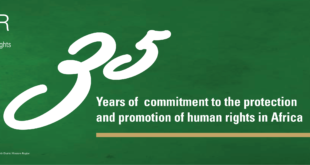Amnesty International speaks out against Eritrea’s Dutch offensive
by Martin Plaut
The Dutch Amnesty International website recently published an article on intimidation and the use of legal action being taken by supporters of the Eritrean regime towards critics in the Netherlands. The critics that are targeted state that this has not discouraged them from publishing. On the contrary, they say that they have become even more determined.
The supporters of the Eritrean regime in the Netherlands keep a close eye on the press and other critics, says Amnesty. If the content is not to their liking, intimidating tweets and court cases may follow. Amnesty is referring to the court cases brought against de Volkskrant, one of the largest Dutch newspapers, and against a Dutch Professor, Mirjam van Reisen. The plaintiffs in these cases accused the newspaper and the Professor of making slanderous statements and comments in the media. The judgements in these cases have rejected the accusations.
The main plaintiff, Mr. Bahlbi, was the chair of the YPFDJ Holland, a youth group that is linked to the only political party in Eritrea, the PFDJ. In a radio interview, Prof. van Reisen referred to him – not by name – as the pivot of Eritrean intelligence in the Netherlands, which Bahlbi denied. However, on the basis of the evidence presented the judge ruled that the YPFDJ can indeed be seen as an extension of the dictatorial regime in Eritrea and that it is sufficiently likely that its members may work as informants for the regime. Bahlbi, however, maintains that the YPFDJ is not legally connected to the PFDJ – but it is ideologically connected, he states in a written reaction to Amnesty. Bahlbi has appealed against the judge’s decision in the case against Van Reisen, stating that she did not present concrete evidence.
Other media and journalists, such as Habtom Yohannes, radio programme Argos and Sanne Terlingen from Oneworld, received notifications from Bahlbi’s lawyer ordering them to remove articles about the subjects and pay compensation, or else face trial. However, ignoring the notifications has not led to court cases for them thus far.
Marjon Bolwijn, a journalist at de Volkskrant, states that the court cases have generally not discouraged stories about Eritrea from appearing in the media. Indeed, Bolwijn feels that it had led to more media attention for the situation in Eritrea and the intimidation taking place. Van Reisen explains that the investigation for the court case has led her to better understand the ties between Eritrea and the YPFDJ and how the “troll network” on the internet functions.
 ELL Eritrean Lowland League
ELL Eritrean Lowland League


